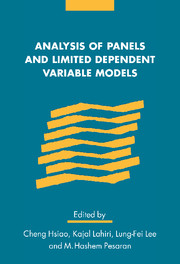Book contents
- Frontmatter
- Contents
- List of contributors
- Foreword
- Introduction
- 1 A note on left censoring
- 2 Autoregressive models with sample selectivity for panel data
- 3 Mixture of normals probit models
- 4 Estimation of dynamic limited-dependent rational expectations models
- 5 A Monte Carlo study of EC estimation in panel data models with limited dependent variables and heterogeneity
- 6 Properties of alternative estimators of dynamic panel models: an empirical analysis of cross-country data for the study of economic growth
- 7 Modified generalized instrumental variables estimation of panel data models with strictly exogenous instrumental variables
- 8 Expectations of expansions for estimators in a dynamic panel data model: some results for weakly exogenous regressors
- 9 Re-examining the rational expectations hypothesis using panel data on multi-period forecasts
- 10 Prediction from the regression model with one-way error components
- 11 Bayes estimation of short-run coefficients in dynamic panel data models
- 12 Bias reduction in estimating long-run relationships from dynamic heterogeneous panels
- CV of G.S. Maddala
- Index
7 - Modified generalized instrumental variables estimation of panel data models with strictly exogenous instrumental variables
Published online by Cambridge University Press: 22 September 2009
- Frontmatter
- Contents
- List of contributors
- Foreword
- Introduction
- 1 A note on left censoring
- 2 Autoregressive models with sample selectivity for panel data
- 3 Mixture of normals probit models
- 4 Estimation of dynamic limited-dependent rational expectations models
- 5 A Monte Carlo study of EC estimation in panel data models with limited dependent variables and heterogeneity
- 6 Properties of alternative estimators of dynamic panel models: an empirical analysis of cross-country data for the study of economic growth
- 7 Modified generalized instrumental variables estimation of panel data models with strictly exogenous instrumental variables
- 8 Expectations of expansions for estimators in a dynamic panel data model: some results for weakly exogenous regressors
- 9 Re-examining the rational expectations hypothesis using panel data on multi-period forecasts
- 10 Prediction from the regression model with one-way error components
- 11 Bayes estimation of short-run coefficients in dynamic panel data models
- 12 Bias reduction in estimating long-run relationships from dynamic heterogeneous panels
- CV of G.S. Maddala
- Index
Summary
Introduction
Use of the generalized method of moments (GMM) has been increasingly popular in the panel data literature. Exogeneity assumptions usually imply a large number of moment conditions in panel data models. Imposing a subset of such moment conditions in GMM, researchers can easily obtain a consistent estimator. GMM also provides simple guidance for efficient estimation: since imposing more moment conditions never decreases asymptotic efficiency, an efficient estimator can be obtained by utilizing all of the moment conditions implied by a model. Based on this idea, Ahn and Schmidt (1995, 1997) and Crépon, Karamarz, and Trognon (1995) examine the moment conditions implied by dynamic panel data models, and show how these moment conditions can be efficiently implemented in GMM.
In terms of asymptotic efficiency, it would always be desirable to use as many moment conditions as possible. However, GMM using a large number of moment conditions may be infeasible or impractical in many cases. In panel data models with strictly exogenous time-varying regressors, the number of moment conditions rapidly increases with the number of time series observations. For example, a model with five strictly exogenous regressors and ten time periods generates 500 moment conditions. It is practically impossible to impose all of these conditions in GMM. There are also statistical reasons why it may not be desirable to use too many moment conditions.
Information
- Type
- Chapter
- Information
- Analysis of Panels and Limited Dependent Variable Models , pp. 171 - 198Publisher: Cambridge University PressPrint publication year: 1999
